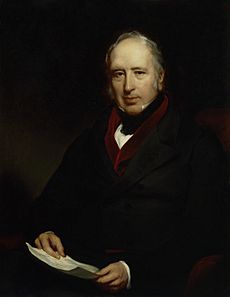Independent scientist facts for kids

An independent scientist is someone who studies science and does research without working for a big university or a government lab. They usually pay for their own projects or find other ways to get money. In the past, these scientists were sometimes called "gentleman scientists" because they often had their own money. This way of doing science was more common in Europe after the Renaissance, but it became less common in the 1900s as more government and company money became available for research.
Many independent scientists have worked with universities or other groups at some point. For example, Charles Darwin, famous for his ideas on evolution, was connected with the Geological Society of London.
Contents
A Look Back: History of Independent Scientists
For a long time, from the Renaissance up until the late 1800s, many scientists paid for their own research. This was especially true in England during the Victorian era. Back then, there wasn't much money from governments or big companies for science projects. Because of this, many early members of the Royal Society in London, a very famous science group, were independent scientists. They used their own money and time to explore new ideas and make discoveries.
Why Choose Independent Science?
Being an independent scientist has both good and not-so-good sides.
Benefits of Being Independent
- Freedom to Explore: Independent scientists can choose exactly what they want to study. They don't have to follow rules set by funding groups or universities. This means they can work on unusual or risky ideas that might not get money from traditional sources.
- Less Paperwork: They don't have to teach classes, do lots of office work, or spend time writing requests for money (called grants). This leaves more time for actual research.
- Owning Discoveries: If an independent scientist invents something new, they usually own the rights to it themselves, not an employer.
Challenges of Being Independent
- Limited Money: The biggest challenge is often money. It can be hard to pay for expensive equipment or long-term projects when you're funding everything yourself.
- Access to Equipment: Modern science often needs special tools and labs. Independent scientists might need to find ways to borrow equipment, work with others, or choose projects that don't need super expensive gear.
Even with these challenges, if their research is successful, independent scientists can publish their findings in the same important science journals as scientists who work for big institutions.
Independent Scientists Today
Even now, there are many independent scientists doing amazing work. They find different ways to support their research.
- Stephen Wolfram funds his science by selling his special software called Mathematica.
- Julian Barbour and Aubrey de Grey are other examples of scientists who fund their own studies.
- James Lovelock was a well-known independent scientist.
- John Wilkinson supports his research on natural products by running a science consulting business.
Sometimes, ideas are so new or different that they are hard to get money for.
- Peter D. Mitchell won the Nobel Prize in Chemistry in 1978 for his ideas, even though his work was considered "radical" and might have been hard to fund.
- Chemist Luis Leloir also won a Nobel Prize in 1970. He funded the research institute he led in Argentina, showing how important independent funding can be.
Today, there are even online groups and organizations for independent scientists, like the Ronin Institute and the National Coalition of Independent Scholars. These groups help independent researchers connect and share their work.
Famous Independent Scientists
Many famous scientists throughout history have worked independently for at least part of their careers. Here are some of them:
- Mary Anning
- Elizabeth Garrett Anderson
- Aristotle
- Hertha Ayrton
- Charles Babbage
- Julian Barbour
- Robert Boyle
- James Braid
- Mark Catesby
- Henry Cavendish
- John Dalton
- Charles Darwin
- Christopher J. Date
- Robert C. Edgar
- Albert Einstein
- Carlo Fornasini
- Benjamin Franklin
- Goldsworthy Gurney
- Oliver Heaviside
- Caroline Herschel
- Robert Kraichnan
- George Frederick Kunz
- Antoine Lavoisier
- Alfred Lee Loomis
- A. Garrett Lisi
- Ada Lovelace
- James Lovelock
- Gregor Mendel
- Isaac Newton
- Joseph Priestley
- David Rittenhouse
- David E. Shaw
- Alexander Shulgin
- Mary Somerville
- Henry Fox Talbot
- Nikola Tesla
- John Wilkinson (scientist)
- Stephen Wolfram
- Thomas Young
- Lord Salisbury
- Konstantin Eduardovitch Tsiolkovsky
Related Topics
- Citizen science
- Small Science and Big Science
 | Aurelia Browder |
 | Nannie Helen Burroughs |
 | Michelle Alexander |

